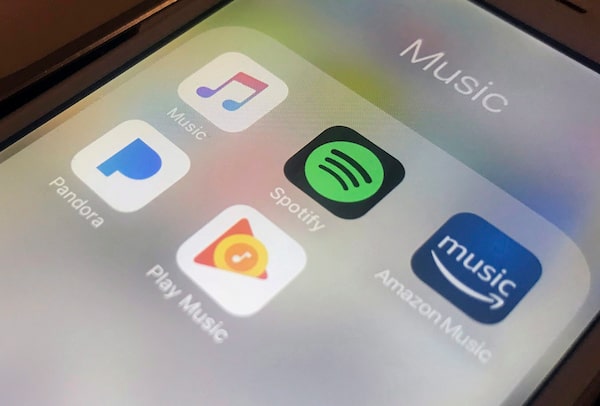
Music streaming apps clockwise from top left, Apple, Spotify, Amazon, Pandora and Google on an iPhone in New York.Jenny Kane/The Associated Press
Canadian songs, especially those written or performed by Quebec artists, are being played far less often on streaming platforms than on radio, and the situation could get worse, the society that collects royalty payments in Canada warned a parliamentary committee on Tuesday.
It predicted that Canada’s songwriters could see their incomes plummet as more people turn to streaming services such as Spotify for their music – unless such platforms are forced by law to promote more Canadian songs.
The Society of Composers, Authors and Music Publishers of Canada told the Senate Transport and Communications committee that “only a fraction” of the royalties it collects from Canadian streaming platforms stay in Canada: just 10 cents of every dollar is distributed to Canadians. The rest goes to artists from America and other foreign countries whose music is played here.
SOCAN said Canadian artists are currently getting 34 per cent of all the royalties it collects from radio and TV, but only 10 per cent of royalties it collects from digital music platforms.
However, Spotify said SOCAN only collects a proportion of royalties that go to Canadians, and not the majority of revenue Spotify pays out, which goes to record labels “who would then pay out to music publishers and songwriters.”
“In Canada, as in other markets, Spotify pays out over two-thirds of its music revenue directly to rightsholders – that’s over $8.9-billion globally in 2021, 8.5 times as much as radio, and 30 times as much as broadcasters of music videos,” said a spokeswoman.
SOCAN’s warning to a Senate committee studying the government’s online streaming bill was echoed by David Bussières, a Quebec singer-songwriter representing Canadian musicians, who told the committee: “Our culture is at stake here.”
Mr. Bussières said Quebec artists have seen their revenues drop dramatically since the advent of streaming platforms, which don’t currently have to promote Canadian content.
The singer-songwriter said streaming platforms should be required by law to make it easy for listeners to find Canadian songs, but also to support Canadian musicians financially.
He said: “The Canadian public and the Quebec public likes its local music – but you can only like what you are exposed to.”
Martin Lavallée, senior legal counsel for SOCAN, told the Senate committee on Tuesday that for songwriters from Quebec the “situation is even more dire” than for other Canadian artists. Quebec artists get only 1.8 cents of every dollar SOCAN collects from online streaming services in Canada, far less than from radio stations which are obliged by law to promote Canadian content.
The online streaming bill would update the broadcast law and make streaming platforms such as Spotify actively promote Canadian songs, as traditional broadcasters are currently obliged to do.
Music streaming apps allow listeners to instantly access their choice of music from all over the world and choose what they listen to.
Spotify says it has revitalized the music industry in Canada, and increased Canadian musicians’ global popularity.
It said it already introduces listeners here to Canadian bands and singers, as well as podcasts and playlists of Canadian and Quebecois music.
In a thinly disguised jab at digital platforms such as YouTube, as well as the Conservatives who oppose Bill C-11, Heritage Minister Pablo Rodriguez told a gathering of Canada’s creative industries that the government would not back down over the bill.
“When I meet with the people working in our culture, they often ask me if we will be able to hold our ground. If we will be able to make every player pay its fair share. I’ll tell you one thing: We will not back down on this,” he said. “To the artists and creators who play an essential role in our culture: We have your backs.”
The Conservatives and digital platforms have warned the bill is poorly worded and unless the language is tightened up it could damage the livelihoods of YouTubers and other digital creators.
Mr. Rodriguez implied they were scaremongering.
“Some people try to invent stuff but bottom line: It’s asking streamers to pay their fair share toward our culture,” he continued. “It makes them showcase the work of our amazing Canadian artists and creators.”
Mr. Lavallée told the Senate committee studying Bill C-11 that the law is needed to safeguard the future of Canada’s music industry.
However, Spotify said it generates eight billion streams of Canadian music or podcasts outside Canada every month, with the top international markets for Canadian artists – including America – providing 7.2 streams of Canadian content for every one in Canada.
Laura Scaffidi, a spokeswoman for Mr. Rodriguez, said Bill C-11 “will create more opportunities for Canadian artists.”
“It will give Canadians more songs to choose from. With that choice, Canadians discovered the Tragically Hip, Leonard Cohen, and Rush. Bill C-11 will make it easier to discover a new generation of talented Canadian artists we can be proud of.”